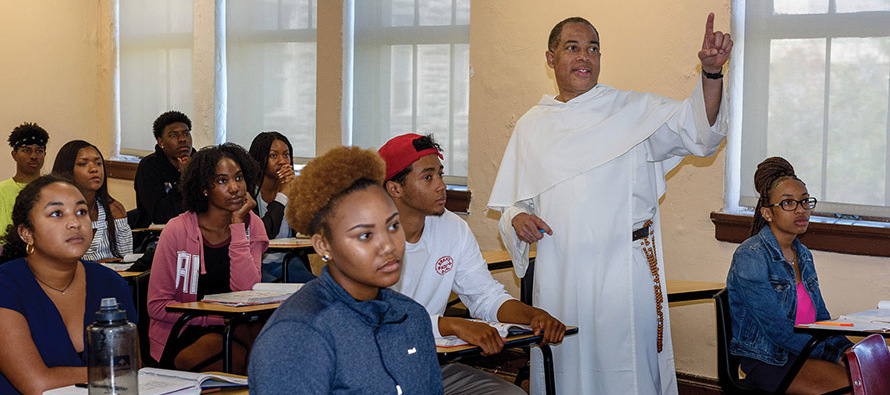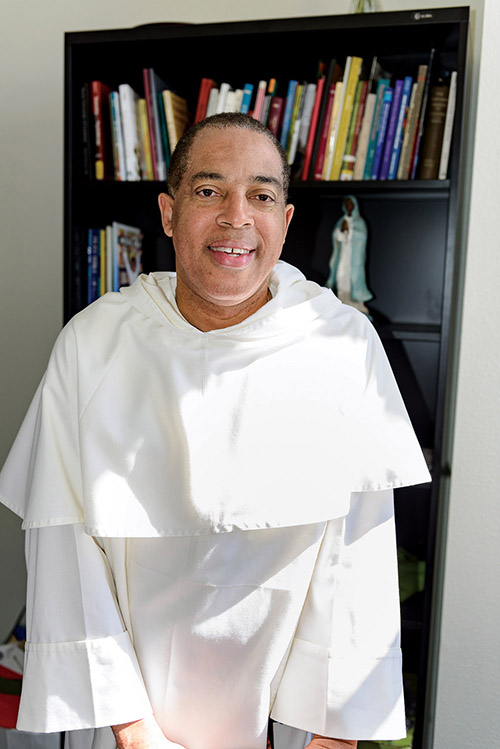Brothers: Keepers of the faith

Brother Herman Johnson, O.P., leading the discussion with his college students, often fields questions about what it means to be a brother. (Photo: Irving Johnson, III, courtesy of Xavier University of Louisiana)
The editors interview Brother Herman Johnson, O.P., a Dominican brother who lives in New Orleans and teaches Spanish at Xavier University of Louisiana.
How did you first discover brothers?
When I was 10, my father read me the story of the Dominican brother Saint Martin de Porres. Immediately I discovered this is what God wanted me to be! It was understandable. Like Martin de Porres, I have beautiful dark skin, speak Spanish, love dogs and cats. I see all people as beautiful, just as he did.
I consider my learned fluency in Spanish as a mystery attributable to the language he spoke. All these qualities are the stuff of the Spirit, shaping the course of my life and my vocational choice. I strive to be my authentic self as a Dominican brother in the spirit of Martin de Porres.
Do your students know what brothers are?
No, but they know me, and I’m often asked, “What is a brother?” along with questions about a brother’s lifestyle and purpose. I tell students there are multiple ways God’s love is manifested. A brother manifests that love one way, a way that is unique and special. A brother models the love of Jesus in the manner he has of reaching out to people. He gives witness to Jesus who walked the earth as a brother.
Is it important to understand the distinction between a brother’s vocation and others?
Distinguishing our role as brothers clarifies the beauty and dignity of our vocation. The ministries of most brothers place them among those who have not and might never enter a house of worship. I stress to young people that we are placed in settings like college classrooms among mostly non-churchgoing people. That means our very presence is ministry. For example I always start class with 30 seconds of silence, acknowledging God’s presence. These 30 seconds are highly appreciated by students. For certain, there is a God-quest among young people.
I also tell people that we brothers pray together a lot as a way of staying connected to Jesus who is our life and as a way of dealing with the challenges of being human.

Do people want to compare brothers to priests?
Yes. When I explain what brothers are, I have to explain the vocation in contrast to priesthood since students inevitably already know about priests in their more public role. However I don’t like to say too much about what a brother is in light of what he is not. It’s like saying “non-Catholic” rather than identifying the actual faith a person holds. A priest’s lifestyle is framed by sacramental duties, whereas a brother, like other Christians, seeks to serve God’s people within a range of talents uniquely his. My students see me in the role of their Spanish professor, yet they clearly come to know and relate to me as a religious person, as a brother.
Describe the vows that brothers take.
The vows of poverty, chastity, and obedience say a lot about who I love. They express a personal faith and attachment to God. First there is the call, and then there is the response. I left other options for the one choice, the choice for Jesus and the concerns of Jesus. As such, the vow of poverty has not been about what I gave up through a simple, communal lifestyle, but what I have received. It might seem unlikely, but the vow of poverty has brought me peace, and peace is what I believe everyone desires. Chastity has been a decision to love everyone and everything with a respect and reverence that reflects God’s love for me. Although contemporary society restricts its understanding of chastity to sexual abstinence, it’s far more than this. It’s about transmitting a love commensurate with the special vocation of a life consecrated to God. It’s a covenant God offered when I first perceived the call to religious life.
Community life and continuous growth in prayer bring focus to my love and remind me of who and what I love. And of course community is closely connected to obedience because I’ve vowed to obey God’s will as expressed through my community. Personally I find the vow of obedience the most challenging of the three vows. Yet prayer and continuous openness to where the Word is pronounced clears and calms my anxiety around decisions and on-going conversion.
How do your students respond to learning about brothers?
The response is very positive; it’s new to them. Also, as these conversations happen, I’ve picked up on things about brothers that are attractive to the young, namely that we live in community and we pray often together. This taps into their own need for communion and belonging.
Fraternity is a big attraction for college men; perhaps belonging to one forever is an initial attention-getter. People need to know that the concerns of God are what call us to be brothers and what sustain us. I do not perceive that my students are turned off by the spiritual underpinnings of our vocation. In fact, they are fully engaged by it precisely because many hunger and hope for something more, something other than what is socially and culturally expected.
Are you happy as a brother?
In general brothers are happy, not because of professional accomplishments and acquisitions, but because we are living out our vocation in joy, happy to stay with “yo boy”—as one of my students refers to Jesus.
My own happiness comes from being at home in my vocation—similar to being at home in one’s skin. Being a brother enables me to be my true self alongside others who seek the fullness of life. The fruits of my brother vocation enrich others in myriad ways. Knowing that I can give something to others gives me a joyful boost. For example, so many people have questions about God and the meaning of life. These are the same questions I struggle with at times, and so I offer insights that come from my own contemplative questioning.
Do you ever invite young men to become brothers?
Yes, in fact I’ve led a number of post-college men into my community, the Southern Dominican Province—four are now permanent members. Asking a young man to consider being a brother can be bold, and responses will range from “No way!” to “I’m very honored.” Either way, I pray often about both types of responses. My foundation is the belief that God still calls men to religious life as brothers.
I look at my own vocation—a lifelong partnership with Jesus our brother—and it’s clear how blessed I’ve been.
Related article: VocationNetwork.org, “My unlikely journey to brotherhood.”
Tags
Related
- A call to let go: Profile of Brother Christopher Campos Erran, O.S.C.
- God had a plan for me
- He blends new tech and old prayer: Profile of Brother Joseph Anoop, F.S.P.
- From physics lab to friary—and back again
- Better together: Profile of Brother David Relstab, O.S.A.
- The secret’s out: Brotherhood is powerful
- Brothers win the race: Profile of Brother Rafael Vargas, S.D.B.
- God called me to be a brother
- Modern “prodigal son” meets the brothers: Profile of Brother Ray Morris, B.H.
- Brotherhood is right for me Read More
Most Viewed
- Find your spirituality type quiz
- Questions and answers about religious vocations
- Celibacy quiz: Could I be a nun? Could I be a brother? Could I be a priest?
- Resources for older discerners or those with physical and developmental differences
- About Vocation Network and VISION Guide

